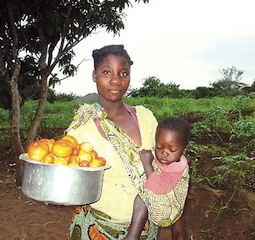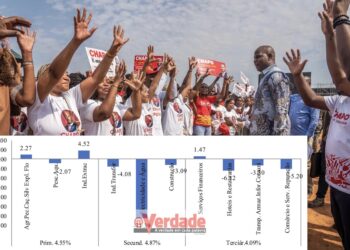 Sixteen year old Maria Rondão had hoped to continue studying, to perhaps break her family’s cycle of poverty. But her father forced her to get married while she still in primary school. Maria had a son and her husband abandoned her. She is one of the 700 million women, many living in poverty and unstable conditions, who were forced into marriage before turning 18. This is according to United Nations (UN) statistics.
Sixteen year old Maria Rondão had hoped to continue studying, to perhaps break her family’s cycle of poverty. But her father forced her to get married while she still in primary school. Maria had a son and her husband abandoned her. She is one of the 700 million women, many living in poverty and unstable conditions, who were forced into marriage before turning 18. This is according to United Nations (UN) statistics.
Early marriages are common in Maganja da Costa, Zambezia province. Maria Rondão, lives in the locality of Canguo and was forced to drop out of school to marry an older man and soon after to be a mother. She was only 14 years old.
Although Paragraph 1 of Article 121 in the Constitution notes that “early marriages violate children’s rights, as they remove the child’s (any individual 18 years of younger) protection that allows them the ability to fully mature. This protection is the obligation of families, communities and the State”. According to the 2011 Mozambique Demographic and Health Survey 48% of women currently between the ages of 20-24 got married before they turned 18 and 14% before they were 15.
For a long time, the Mozambican government did not include this constitutional right under the national development agenda. This is according to the Coalition for the Elimination of Early Marriage (CECAP), which brings together civil society organizations (CSOs) and International Non-Governmental Organisations (NGOs) working in the field of child protection and defense in Mozambique.
However, in a public statement made on October 11, the International Day of the Girl, CECAP notes that the “government of Mozambique has recently expressed its commitment to the eradication of child marriages through the preparation, approval and implementation of a National Strategy of Prevention and Combating Early Marriage.”
But this measure is still far-off from helping the millions of girls like Maria who desire to go back to school to continue their studies. She is frustrated at her guardian who arranged a husband for her in return for money.
“My father forced me to marry a person who does not work. We live off of agricultural production and ever since my son was born my husband left home and he does not support his child”, the teenager laments while carrying tiny Xavier on her back. In addition to being unemployed, her husband drank frequently and physically assaulted Maria. This year Maria got a good crop of tomatoes which she will sell in the local market. She enrolled in an agriculture conservation program, sponsored by the League of Children’s Rights in Maganja da Costa.
“I should have defied my father”
It is a daily struggle for Maria to try and improve the diet of her and her child, who is only 2 years old. They live in a tiny, precariously constructed hut. Almost irrationally, Maria insists on feeding her child a balanced diet and refusing to subscribe to malnutrition that affects the majority of births from mothers younger than 20.
Several studies also indicate that, in many cases, parents think it is in the daughter’s best interest to marry early and that marriage will protect her from physical and sexual violence. However, this belief causes girls to be placed at greater risk of violence, which can have devastating effects on their health and long-term development.
“I am very sad about the life that my father outlined for me. I did not hope for this. I had a dream to study and to take care of my brothers”, Maria says. She regrets not having stood up to her father but at the time “I was very young and I could not do it.” Still, Maria’s dream is to go back to school and become a doctor.
“I want to study, but I have no one to leave my son with,” she says, which is perhaps contrary to the statistics of Maganja da Costa’s District Services of Education, Youth and Technology (SDEJT), which states that in 2014 at least 2,230 out of 36,387 girls enrolled in school dropped out due to early marriages and pregnancies.
Involuntary marriages in Mozambique result from the combination of traditions, such as initiation rites in which girls aged 8 to 12 years are declared ready for marriage, poverty which plagues most Mozambicans, and social and economic problems that lead to parents encouraging their daughters to marry at the earliest opportunity in order to obtain financial income.
In the study on “The State of the World’s Children Report 2014”, the United Nations Children’s Fund (UNICEF), Mozambique occupies the 11th position in the ranking of countries with the highest rate of early marriages. The research indicates that forced sexual initiation and early pregnancy can also have lasting and harmful effects on the physical, emotional and psychological health of the victim and these effects remain throughout her life. Several Mozambican and international organizations classify child marriage as a violation of human rights.
In November this year, the UN agreed that all members should enact and enforce laws prohibiting child marriage, resolving to put an end to a practice that affects about 15 million girls annually. The group of 193 nations of the General Assembly that deals with human rights adopted, by consensus, a resolution which calls on all States to adopt measures to end “early and forced child marriage.”


